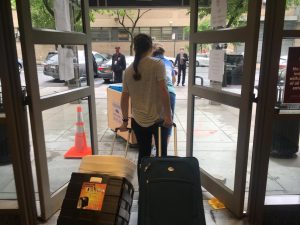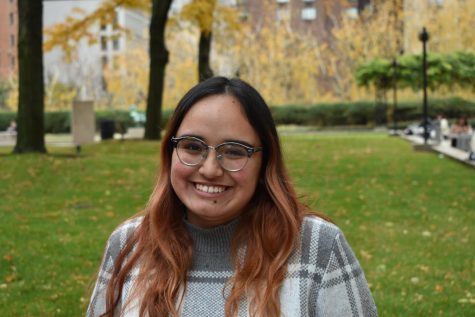ResLife Expects Fewer Residents Following Decrease in Class Size
All returning students and incoming first-years are expected to receive housing for the fall 2022 semester
The number of residents on campus next year is expected to be close to maximum capacity for the residence halls.
April 10, 2022
As the 2022-23 housing registration process comes to a close, the Office of Residential Life (ResLife) projects that it will be able to accommodate all students who completed their housing applications, as well as the incoming first-year students, for the fall semester.
Gregory Jones, director of ResLife at Fordham Lincoln Center (FLC), reported that approximately 780 returning students registered for on-campus housing for the 2022-23 school year, which is on par with previous years’ registration totals.
In the 2018-19 academic year, ResLife housed what is now considered pre-pandemic levels of building occupancy, straining to accommodate residents and introducing forced doubles and forced triples. Many residents did not return to campus during the 2020-21 academic year due to the COVID-19 pandemic, allowing ResLife to de-densify dorm rooms and no longer have forced triples.
“There is still a lot of time before the enrolling class is solidified, and there is not a final number yet of enrolling residential students.” Gregory Jones, director of ResLife at FLC
For the 2021-22 academic year, Fordham over-accepted students based on enrollment predictions, but more students than expected committed to the university. This over-acceptance of students resulted in an influx of first-years occupying the first six floors of McMahon Hall, the upperclassmen residence hall. Now, ResLife expects pre-pandemic occupancy — a return to normalcy — for the 2022-23 academic year.
ResLife does not have a definitive count for new first-year students who are requesting housing, as many have yet to place their deposits, according to Jones.
“There is still a lot of time before the enrolling class is solidified, and there is not a final number yet of enrolling residential students,” Jones explained. He noted that available housing is measured in compliance with the Office of Admissions statistics and added that the number of available rooms is coordinated in order to only make housing offers to a specific number of first-year applicants.
The acceptance rate for the Class of 2026 at FLC fell, with 13% fewer students and 15% fewer residents admitted to FLC compared to the Class of 2025, according to Patricia Peek, dean of undergraduate admissions.
Peek said the Office of Admissions is “looking to bring in a smaller first-year class this year across the colleges,” a variation from the admission cycle for the Class of 2025, which is the largest class accepted in the university’s history. According to Peek, it is forecasted that there will be 580 students starting the fall 2022 semester, with 340 who will be FLC residents.
Based on the predicted size of the incoming class and its residential students, Jones foresees that housing will be similar to pre-pandemic levels, with the expectation of nearly 100% occupancy. However, he added that if the number of incoming students exceeds expectations, ResLife “may triple or quad some first-year rooms,” which has been standard practice in past years.
For returning students, housing deposits opened on Feb. 15, with a submission deadline on March 1. Students could receive housing through the group selection process or room selection overflow process, where decisions will be released on a rolling basis in the spring.
“We try to grant as many roommate requests as possible, but the ability to do so is dependent on available rooms and the number of requests.” Gregory Jones
The application for the incoming class does not open until June, granting students several weeks to complete registration. Residents are expected to receive their housing status in early August.
Jones noted that while any student who has met the deadlines and is guaranteed a spot will receive housing, not everyone is confirmed to have their first choice in accommodation.
“The room selection process relies on a random lottery and with a limited number of each type of housing available … We try to grant as many roommate requests as possible, but the ability to do so is dependent on available rooms and the number of requests,” Jones said.
“The process went well, but it was certainly not the most straightforward.” Abby Grunzinger, FCLC ’25
Some students reported initially feeling stress and confusion while completing the stages of housing registration.
“The process went well, but it was certainly not the most straightforward,” Abby Grunzinger, Fordham College at Lincoln Center (FCLC) ’25, said. “It was a little stressful in terms of figuring out exactly what to do to get the setup that we wanted.” She cited, specifically, that the housing registration process received by ResLife did not match the registration portal on her screen.
Julia Jaramillo, FCLC ’25, said she experienced confusing communication with the Google form supplied by ResLife in search for roommates, due to ResLife urging rising sophomores to make groups of six for housing since that is all that would remain when they registered. Having a short period of time to find other roommates and create a housing plan was challenging and a large source of Jaramillo’s concern.
“My group and I struggled to find 2 more people (since) the Google form they had to look for roommates wasn’t much of a help because everyone on there was also trying to find just 1 or 2 people to fill a group,” she said.
Grunzinger, at first, grew worried after not receiving a confirmation email upon completion of the selection process but has since felt certain that she will earn the room fit for a group of six following discussions with ResLife that clarified information.
“I left feeling uneasy about whether or not I actually had a room… Even with these hiccups, (ResLife) was incredibly helpful,” she said. “They were able to answer my questions or very quickly direct me to someone who could.”
The room selection process ended on March 31, but residents who did not select an apartment will be assigned housing over the summer.














